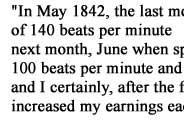How We Know What We Know
 Find out more |
Using heavy machinery could be very dangerous; workers needed to pay constant attention. Even so, it was not unusual for workers to jam their fingers; more serious injuries were not uncommon. Experienced workers warned the new girls to wear their hair tied up and to always stay clear of the rapidly moving belts and gears. |
 Find out more |
In 1844 a Lowell textile worker described how her job had changed in the previous two years. New technology made it possible to run the machinery faster and faster. Although she was tending twice as many looms and producing much more cloth, she was only earning a little bit more money each month. And she was more exhausted when she left the mill each day. |
 Find out more |
Songs were a traditional way to express protest. In the 1830s and 1840s, the words of the Irish ballad "I Will Not Be a Nun were rewritten. The new version, "I Shall Not be a Slave," was a popular protest song among "mill girls" in Lowell and other factory towns. |
Copyright ©2003 Tsongas Industrial History Center, 400 Foot of John St., Lowell, MA 01852. E-Contact: Ellen_Anstey@uml.edu.
